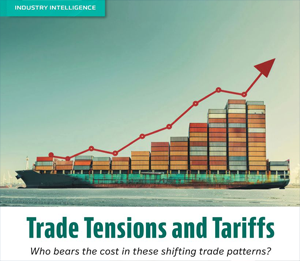
| 1/24/25 |
 |
Dear [Colleague]:
I was struck this week by the similarities and contrasts in the messages of the newly elected leaders of the United States and the European Commission. Although there are significant differences in how each government proposes to address the issue, both U.S. President Donald Trump and European Commission President Ursula Von der Leyen said a new era of more intense trade conflicts has arrived. In his first week back in office, Trump issued an “America First” trade policy that presents both risks and opportunities for electronics, while Von der Leyen emphasized the need to make Europe more competitive globally.
We were also encouraged to see a new study by the author of one of the most influential books on semiconductors, who says the rest of the electronics ecosystem matters, too.
Read on for the details of these and other stories and let us know your concerns and questions. We advocate for you year-round, but your input and active support are crucial.
Chris Mitchell
Vice President, Global Government Relations
The Headlines at a Glance:
TOP NEWS OF THE WEEK
QUOTE OF THE WEEK
UNITED STATES
EUROPEAN UNION
ENVIRONMENT AND SUSTAINABILITY
OTHER HEADLINES IN THE NEWS
UPCOMING EVENTS
HELP US SPREAD THE WORD ON SOCIAL MEDIA
KEEP IN TOUCH WITH US
 |
Trump Orders Sweeping Reviews of Trade and Tech Policies: On his first days back in the White House this week, U.S. President Donald Trump issued a wave of executive actions that appear likely to affect electronics and other industries. Perhaps the most notable was an “America First Trade Policy,” which orders more than a dozen reviews by federal agencies of trade agreements, export control policies, the U.S.-Mexico-Canada Agreement (USMCA), and relations with China to determine their impacts on U.S. economic and national security. The memo also directs the agencies to make recommendations on tariffs and other regulatory, enforcement, and legislative actions to overcome unfair trade practices and negative impacts on U.S. national security and economic competitiveness. Altogether, the policy memorandum will kick off months of studies and subsequent actions that will lead to numerous risks and opportunities for electronics. IPC will continue to monitor and engage in the policy dialogue and keep you informed. Please let us know your questions and comments. IPC Contact: Rich Cappetto.
EC President Foresees “Harsh” Competition, Emphasizes Competitiveness: Speaking this week at the World Economic Forum in Davos, Switzerland, European Commission President Ursula Von der Leyen said, “The cooperative world order we imagined 25 years ago has not turned into reality,” and instead, “we have entered a new era of harsh geostrategic competition.” To cope with this shift, Von der Leyen stressed the need to boost EU competitiveness, an approach that will be further detailed in the Commission’s anticipated “Competitiveness Compass” plan. At the same time, Von der Leyen highlighted the parallel concern that in these times, the EU “wants more cooperation with all who are open for it”, including the United States, China, and India. IPC Contact: Alison James.
 |
 |
– IPC President and CEO John W. Mitchell on a new study by semiconductors expert Chris Miller, who highlights the security risk of a shrunken U.S. industrial base for electronics manufacturing (see related story below)
 |
New Study Calls Shrinkage of U.S. Electronics Sector a Security Risk: A new study by a noted expert on semiconductors concludes “the grave deterioration of the North American electronics manufacturing base is a security risk” and must be remedied with new policies. Echoing IPC's “silicon-to-systems” campaign, Chris Miller, author of the book Chip War: The Fight for the World's Most Critical Technology, writes, “Today, every defense system relies on electronic components, an increasingly large share of which can be produced only in Asia. The Chips and Science Act will partly address this problem for chips, but it exists in other segments of the supply chain too.” IPC’s seminal 2021 report on the North American electronics ecosystem is cited. Miller calls for expanding current policies beyond microchips to diversify electronics component manufacturing. The report is another sign that IPC’s call for a broader approach to U.S. industrial base security is being heard. “Like” and share this LinkedIn post by IPC’s John Mitchell if you agree. IPC Contact: Chris Mitchell.
IPC and PCBAA Lobby Congress on Tax Credit for PCBs: Last week, IPC and the Printed Circuit Boards Assn. of America (PCBAA) led nine electronics CEOs through a series of meetings on Capitol Hill in support of a 25% tax credit for sourcing printed circuit boards in the United States. The credit, which was included in H.R. 3249 by Rep. Blake Moore (R-UT) in the last Congress, is aimed at increasing demand for domestic production of PCBs. The Republican-controlled Congress and the Trump administration have set a goal of passing tax legislation by Labor Day 2025. The IPC members visited 13 members of Congress, including nine who sit on the congressional tax writing committees. Participants included the top executives of Amphenol, Delta Circuits, Eagle Circuits, Electronics Interconnect, Isola, Summit Interconnect, STI Electronics, TCLAD, and TTM Technologies. IPC Government Relations will be hosting another advocacy day on February 20th as part of the EMS Roundtable in Washington, DC. Contact Rich Cappetto for more information on opportunities to help us advocate for the electronics industry.
Apply Through Feb. 3 for U.S. Government Loans for Critical Techs: The application window for the U.S. Department of Defense’s Strategic Capital Equipment Finance program is open for about another 10 days, through February 3. The DoD Office of Strategic Capital (OSC) is offering loans from $10 million to $150 million for capital investment and equipment purchases related to critical technologies in the defense supply chain. IPC has been facilitating OSC information-sharing with electronics industry leaders since last summer. Learn more about the loan program here and contact Rich Cappetto with any questions.
 |
European Tech Sovereignty VP Officially Launches Chips Act Pilot Lines: Last week, European Commission VP Henna Virkkunen officially launched five pilot lines for state-of-the-art research and innovation in semiconductor technology, bringing a key element of the European Chips Act to fruition. At an event in Brussels, Virkkunen said the pilot lines will address five key areas: beyond 2nm leading-edge system-on-chip; fully depleted silicon-on-insulator applications; advanced packaging; wide-bandgap materials; and advanced photonic integrated circuits. The pilot lines will provide open access to state-of-the-art research facilities, aiming to strengthen Europe’s industrial competitiveness and innovation across diverse sectors. IPC Contact: Alison James.
Brussels Releases Guidance on Outbound Investment Screening: The European Commission has released a much-delayed recommendation to EU countries on the oversight of outgoing investments in three priority sectors: semiconductors, artificial intelligence and quantum technologies. The recommended scope of technologies for review is broad, including “assembly, testing and packaging of integrated circuits and other semiconductors, including advanced printed circuit boards and packaging.” The recommendation springs from the EU’s economic security strategy unveiled over a year ago by EC President Ursula von der Leyen, aiming to safeguard sensitive technology, research, and infrastructure. The screening proposed exercise would run until June 2026 and include investments dating back to January 2021. The review of outbound investments will inform a decision on whether further action is needed – at EU and/or national levels - to address any risks identified. As always, IPC will continue to monitor the implications for electronics, and we welcome your input. IPC Contact: Alison James.
 |
European Commission Finalizes Waste Management Rule: The European Commission has published the final version of its Packaging and Packaging Waste Regulation (PPWR), which will now enter into force in 20 days and become fully applicable in 18 months. The regulation creates a legal framework for the full life cycle of packaging and includes measures to reduce the production of packaging waste, promote reuse, and encourage recycling and other forms of recovery. IPC is continuing to study the rule and its implications for electronics; we welcome your questions and comments. IPC Contact: Diana Radovan.
European Commission Proposes New Exemptions Under RoHS: The European Commission has published three revised exemptions under the Restriction of Hazardous Substances Directive (RoHS), with significant implications for electronics. The exemptions are:
The RoHS Directive restricts the use of certain hazardous substances in electrical and electronic equipment if they can be replaced by safer alternatives. Under certain conditions, the RoHS Directive allows for temporary exemptions. Some of the newly proposed exemptions are amendments, and some are extensions. Among the recommended extensions, several will expire by end of 2026, meaning any further extension requests will need to be submitted to the EC by the end of June 2025. Related to these actions, the EC has published three draft Delegated Directives for public consultation: here, here, and here, respectively. The deadline for public comments is 10 February. IPC is planning to consolidate industry input; let us know if you want to be involved. IPC Contact: Diana Radovan.
 |
WHMA Annual Global Leadership Summit 2025 (Fort Myers, Florida), Jan. 28-30: The wire harness industry is constantly evolving with new technology and practices. The 2025 WHMA Annual Global Leadership Summit offers the tools you need to help your business succeed in this fast-changing landscape. This is a networking event for executives representing wire harness manufacturers, OEMs and suppliers for companies that build wiring harnesses and cable assemblies. Learn more and register here.
PEDC-Pan-European Electronics Design Conference (Vienna, Austria), Jan. 29-30: Co-hosted by FED and IPC, the conference is held on two days, in English, highlighting the latest developments in electronics design, from “Silicon-to-Systems” to the role of AI in design. Topics include development, design for excellence, software and tools, design process of electronic systems and the “green line” throughout the electronics product life cycle. Learn more and register here.
IPC EMS Leadership Roundtable: Public Policy and Your Business (Washington, DC), Feb. 19-20: If you care about the future of the EMS sector, join us in DC to dive into key policy topics, network with industry leaders, enjoy a reception and dinner, and participate in optional meetings with policymakers to shape the future of EMS. Learn more and register here.
IPC APEX EXPO 2025 (Anaheim, California), Mar. 15-20: Discover the newest innovations and hear from the best minds in the electronics manufacturing industry. IPC APEX EXPO 2025 will be our industry’s largest event in North America, featuring a world-class trade show, professional development courses taught by industry experts, non-stop networking and more. Learn more and register here.
 |
 In an interview with Work Forces, David Hernandez, IPC’s VP of education, shares how he fell in love with manufacturing “through a very weird series of events” and how this sparked his interest in meeting the workforce challenges faced by the electronics industry, and the need for a shift in education to meet the urgent demands of modern manufacturing. Watch Video. |
 “Tariffs often produce unintended consequences, and understanding who truly bears these costs will be essential for informed decision-making in a complex, interconnected global economy.” Shawn DuBravac, PhD, CFA, IPC chief economist, discusses the possible effects of tariffs on the electronics industry in his latest column, “Trade, Tension and Tariffs,” in IPC Community magazine. |